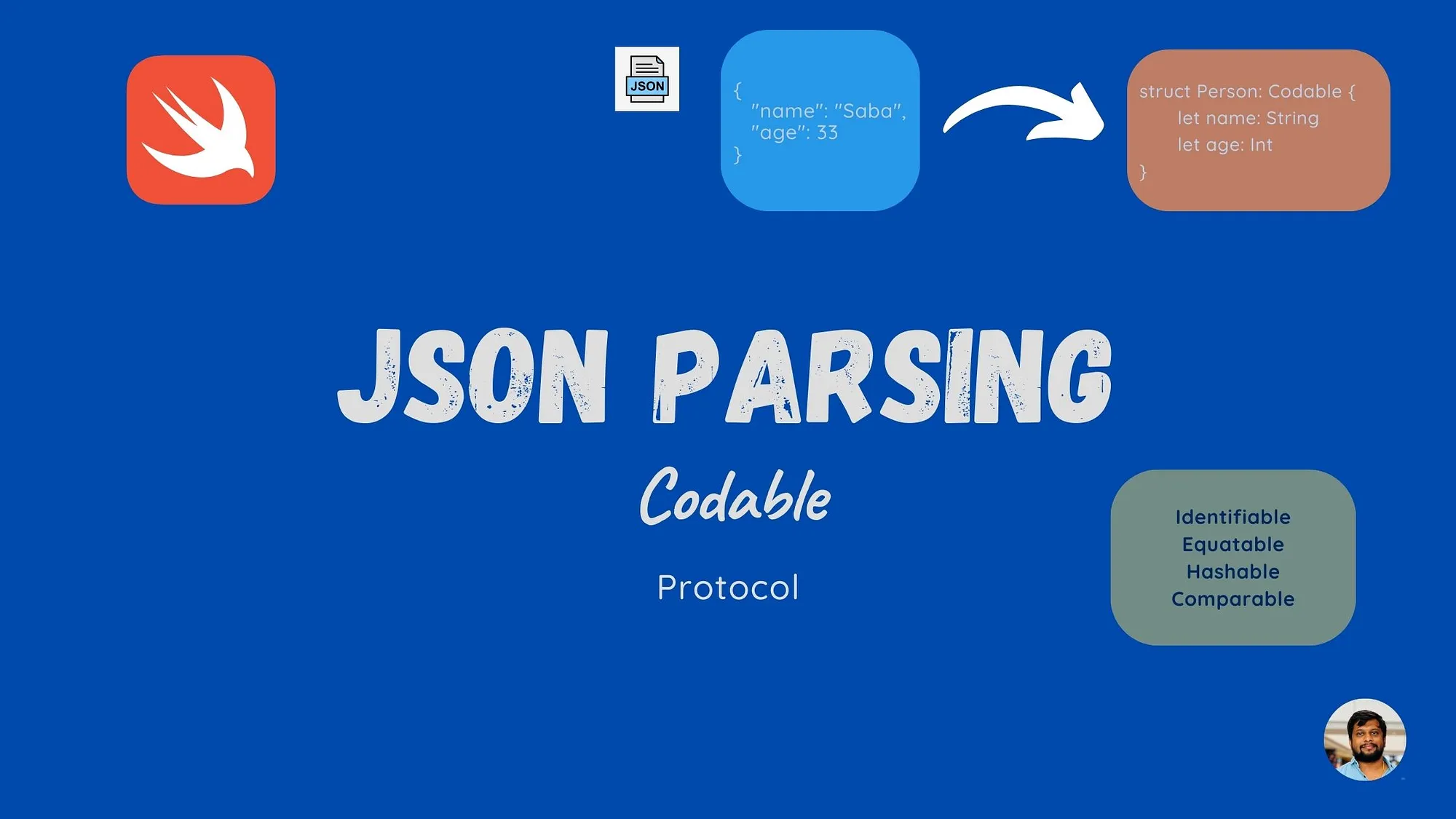How to parse JSON using Coding Keys in iOS

JSON Parsing - Codable Protocol
JSON parsing in Swift is to decodes JSON to display the data in a user-interactive way. Translation of the data to a readable format.
Let’s explore the JSON parsing with the following protocols
Decodable
Encodable
Codable
Identifiable
Equatable
Hashable
Comparable
We will explore CodingKeys and Container.
Older Approach
JSON Serialization
JSON Serialization is an older approach to parsing the JSON.
import Foundation
// Your JSON data as Data
let jsonData = """
{
"name": "Sabapathy Rajkumar",
"age": 33,
"email": "saba@iosdev.com"
}
""".data(using: .utf8)!
do {
// Parse the JSON data
if let json = try JSONSerialization.jsonObject(with: jsonData, options: []) as? [String: Any] {
// Access individual values from the JSON dictionary
if let name = json["name"] as? String,
let age = json["age"] as? Int,
let email = json["email"] as? String {
print("Name: \(name)")
print("Age: \(age)")
print("Email: \(email)")
}
}
} catch {
print("Error parsing JSON: \(error.localizedDescription)")
}JSON Serialization Example
Preferred Approach
Codable Protocol is widely used in Swift programming and it helps in parsing the data. Based on the Swift Standard Library
Before going into the Codable, we should understand the benefits of Decodable and Encodable
Decodable
A type that can decode itself from an external representation.
protocol DecodableDecodable Protocol
Conforming to the Decodable allows for the creation of model objects directly from the external representation such as JSON or GraphQL. It can be via an API request.
Conforming to the Decodable Protocol
struct Person: Decodable {
let name: String
let age: Int
}Person Model
Decoding Data
import Foundation
// Your JSON data as Data
let jsonData = """
{
"name": "Sabapathy Rajkumar",
"age": 33,
"email": "saba@iosdev.com"
}
""".data(using: .utf8)!
do {
let person = try JSONDecoder().decode(Person.self, from: jsonData)
print("Name: \(person.name)")
print("Age: \(person.age)")
} catch {
print("Error decoding JSON: \(error.localizedDescription)")
}Decoding data using JSONDecoder
Encodable
A type that can encode itself to an external representation.
protocol EncodableEncodable Protocol
Conforming to the Encodable used for encoding or serializing Swift objects into the external representation such as JSON or GraphQL. It helps with data interchange, persistence or transmission over the network or updates the data in the database via API request.
Encoding Data
let person = Person(name: "Sabapathy Rajkumar", age: 33)
do {
let jsonData = try JSONEncoder().encode(person)
let jsonString = String(data: jsonData, encoding: .utf8)
print("JSON: \(jsonString ?? "")")
} catch {
print("Error encoding JSON: \(error.localizedDescription)")
}Encoding Data using JSONEncoder
Codable
A type that can convert itself into and out of an external representation.
typealias Codable = Decodable & EncodableCodable Protocol
We can conform to the Codable Protocol when we create a custom custom class, struct or enum. A powerful feature in Swift for JSON parsing. We can parse JSON or any other external representation such as XML, plist (Property Lists) or GraphQL.
Decoding Data
import Foundation
// Define a struct or class that conforms to Codable
struct Person: Codable {
let name: String
let age: Int
let email: String
}
// Your JSON data as Data
let jsonData = """
{
"name": "Sabapathy Rajkumar",
"age": 33,
"email": "saba@iosdev.com"
}
""".data(using: .utf8)!
do {
// Decode the JSON data into a Swift object
let person = try JSONDecoder().decode(Person.self, from: jsonData)
print("Name: \(person.name)")
print("Age: \(person.age)")
print("Email: \(person.email)")
} catch {
print("Error decoding JSON: \(error.localizedDescription)")
}Conforms to Codable Protocol and Decoding the data
CodingKeys
Let’s discuss CodingKeys
Why do we need CodingKeys in the Codable protocol?
protocol CodingKey : CustomDebugStringConvertible, CustomStringConvertible,
SendableCodingKey Protocol
CodingKeys are a powerful way to customize the encoding and decoding of your Swift types to and from JSON.
Conversion between CamelCase and snake_case
{
"username": "sabapathy",
"user_age": 33,
"user_mail": "saba@iosdev.com",
"occupation": "iOS Developer"
"password": "****"
}Example JSON
Use-cases
Mapping JSON keys with swift properties
{
"username": "sabapathy",
"user_age": 33,
}Example JSON for this usecase
Lets take an example - User Model conforms to Codable protocol
struct User: Codable {
let username: String
let age: String
enum CodingKeys: String, CodingKey {
case userName
case age = "user_age"
}
}CodingKeys Example
Ignoring properties
If we want to exclude the properties from encoding and decoding, we can ignore such properties
struct User: Codable {
let username: String
let password: String
enum CodingKeys: String, CodingKey {
case username
// Omit password during encoding and decoding
}
}Ignoring property - Password
Container refers to an object provided by Swift’s Codable framework that allows you to access and decode values from a JSON representation. Containers are used to navigate the hierarchical structure of JSON data and extract values associated with specific keys.
Two primary types of containers are used in JSON parsing with Codable:
Keyed Container
In Encodable
func container<Key>(keyedBy type: Key.Type) -> KeyedEncodingContainer<Key>
where Key : CodingKeyEncodable - Keyed Container
In Decodable
func container<Key>(keyedBy type: Key.Type) throws -> KeyedDecodingContainer<Key>
where Key : CodingKeyDecodable - Keyed Container
Take the example of a Container
struct User: Decodable {
let username: String
let age: Int
enum CodingKeys: String, CodingKey {
case username
case age = user_age
}
init(from decoder: Decoder) throws {
let container = try decoder.container(keyedBy: CodingKeys.self)
name = try container.decode(String.self, forKey: .name)
age = try container.decode(Int.self, forKey: .age)
}
}Keyed Container Example
Unkeyed Container
It is used when decoding JSON arrays. It allows you to iterate over an array of values without explicit keys. You typically use this container when decoding JSON arrays of objects.
struct User: Decodable {
let usernames: [String]
enum CodingKeys: String, CodingKey {
case usernames
}
init(from decoder: Decoder) throws {
let container = try decoder.container(keyedBy: CodingKeys.self)
var usernamesContainer = try container.nestedUnkeyedContainer(forKey: .usernames)
var usernamesArray = [String]()
while !usernamesContainer.isAtEnd {
let username = try usernamesContainer.decode(String.self)
usernamesArray.append(username)
}
usernames = usernamesArray
}
}Unkeyed Container Example
Advantages of JSONDecoder over JSONSerialization
JSONDecoder uses the high-level mechanism specially designed for mapping JSON data to custom Swift types
User-friendly because it automatically maps JSON keys to Swift properties.
Automatic error handling and customising the decoding process by implementing the initializer using CodingKeys for renaming or omitting properties
Highly recommended while dealing with complex data structures and APIs.
Identifiable

Identifiable real-time example
A class of types whose instances hold the value of an entity with stable identity.
protocol Identifiable<ID>Identifiable Protocol
Identifiable provides a default implementation for class types using ObjectIdentifier which is unique for the lifetime of the object. It is always unique like UUIDs.
Practical Example
struct Caretaker: Codable, Identifiable {
var id = UUID()
let caretakerPic: String
let caretakerName: String
enum CodingKeys: String, CodingKey {
case caretakerPic = "caretaker-pic"
case caretakerName = "caretaker-name"
}
}Identifiable Example
Use Case
To have uniqueness in the models and that helps in iterating easily.
When to use Identifiable protocol
In SwiftUI — Iterating the elements of the Collection or Model Objects.
// Model
struct Chatlog: Codable, Identifiable {
var id = UUID()
let messageID: Int
let text: String
}Chatlog Model
Usage
//Usage of Identifiable protocol in ForEach
@State var chatlog: [Chatlog]
ForEach(chatlog.sorted { $0.messageID < $1.messageID}, id: \.id) { chat in
ChatView(chatlog: chat)
}Usage of Identifiable
Modelling entities with identity using Swift value types
Equatable
A class of types whose instances hold the value of an entity with stable identity.

Equatable real-time example
🤎
Hashable and Comparable conforms to Equatable Protocol
Definition
protocol EquatableEquatable Protocol
Use Case
For a Structure and Enum must conform to Equatable protocol for automatic synthesize.
When to use the Equatable protocol
Lack of Identity
Attribute-based Equality
Immutability
Automatic Synthesize
Equality by reference
Hashable
A type that can be hashed into a Hasher to produce an integer hash value.

Hashable real-time example
Definition
protocol Hashable : EquatableHashable Protocol
Use Case
Hash values allow for efficient data retrieval in collections.
When to use Hashable Protocol
struct TableViewData: Hashable, Identifiable, Decodable {
var id = UUID()
var base: String
var currencyCode: String
var currencyName: String
}Hashable Use case
In SwiftUI, we can make use of \.self in ForEach.
ForEach(viewModel.tableViewDataArray, id: \.self) {
Text($0.currencyCode).tag($0.currencyCode)
}SwiftUI Example
It is said to be KeyPaths. Swift generates hash values for each object and uses them to identify it. CoreData is the ideal example for Hashable because it’s already compliant with the protocol.
SPONSOR

The Unique iOS Swift Conference in the UK
SwiftLeeds is a premier iOS conference taking place on October 7-8 this year. If you’re looking to stay updated on the latest trends in iOS development and connect with like-minded professionals, this event is a must-attend! Don’t miss out—book your tickets now!
Get your tickets!Comparable
A type that can be compared using the relational operators <, <=, >=, and >.

Comparable real-time example
Definition
protocol Comparable : EquatableComparable Protocol
The Comparable protocol is used for types that have an inherent order, such as numbers and strings.
Use Case
When you have two Struct objects — first name, last name, city. We can compare those two instances by using the Comparable protocol
struct Person: Comparable {
var firstName: String
var lastName: String
var age: Int
}
let person1 = Person(firstName: "John", lastName: "Doe", age: 30)
let person2 = Person(firstName: "Jane", lastName: "Smith", age: 25)
// Comparable usage
let people = [person1, person2]
let sortedPeople = people.sorted()
print("People sorted by last name and age:")
for person in sortedPeople {
print("\(person.firstName) \(person.lastName), \(person.age)")
}Comparable Usage with two different models
When to use Comparable
Incomparable Limitations with No Equal
Comparable Benefits
struct Date {
let year: Int
let month: Int
let day: Int
}
extension Date: Comparable {
static func < (lhs: Date, rhs: Date) -> Bool {
if lhs.year != rhs.year {
return lhs.year < rhs.year
} else if lhs.month != rhs.month {
return lhs.month < rhs.month
} else {
return lhs.day < rhs.day
}
}
}Comparable Benefits
Note
Please find the GitHub Repo
This is a free third party commenting service we are using for you, which needs you to sign in to post a comment, but the good bit is you can stay anonymous while commenting.

